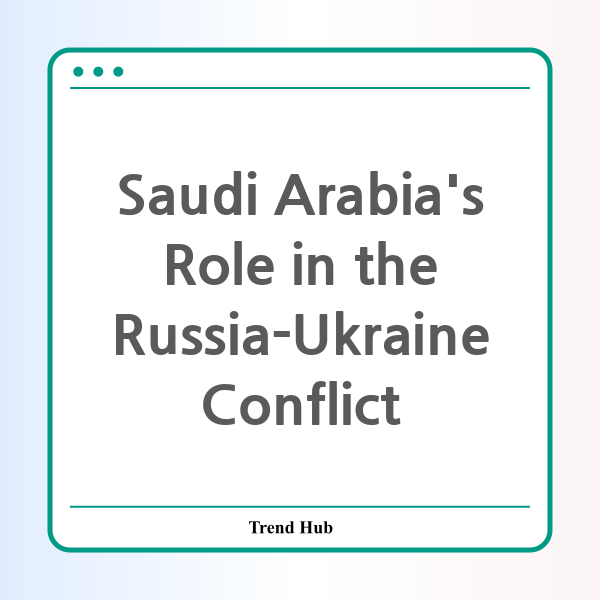* This website participates in the Amazon Affiliate Program and earns from qualifying purchases.

As the conflict between Russia and Ukraine continues to evolve, the geopolitical landscape shifts dramatically with every summit and diplomatic meeting. Recently, a significant summit convened in Riyadh, which happens to be pivotal not only for the fortunes of Moscow and Kyiv but also for the broader international order. How does Saudi Arabia fit into this intricate web of diplomacy?
In what could be seen as a partial victory for Russia, the Riyadh summit has revived Moscow's position on the global stage, allowing it to mount a narrative that portrays the ongoing war in Ukraine as a defensive maneuver against NATO aggression. This portrayal serves a dual purpose: it helps maintain a domestic facade of legitimacy for the Kremlin while also attempting to sway international public opinion.
With US Secretary of State Marco Rubio indicating a potential normalization of embassy operations, we witness the outlines of a fragile diplomatic thaw. However, it remains essential to question who truly benefits from this. While Russia may celebrate this semblance of progress, Ukraine's leadership, under President Volodymyr Zelensky, is understandably skeptical. Zelensky's response following the summit highlighted a crucial point: agreements concerning Ukraine should not be made without its direct involvement.
The Riyadh meeting has also reignited a debate on the relevance of Europe in this conflict. In a week marked by geopolitical whiplash, it became clear that Europe cannot afford to be sidelined. Statements from US officials asserted the importance of European nations in future peace negotiations, contradicting earlier sentiments that suggested a limited role for them. As European leaders react to the evolving dynamics, we see a sense of urgency to recalibrate their position in the face of growing threats from Russia.
In recent dialogues, US officials have emphasized the need for Europe to take a more active stance in its defense, especially when US support seems variable. The comments from the US defense secretary about the US no longer being the primary guarantor of European security signal a paradigm shift. European nations are left contemplating their security strategies as they grapple with the implications of a nuclear-armed Russia becoming ever more emboldened.
However, one cannot ignore the implications for Saudi Arabia amid these developments. The kingdom has taken on an unexpected role as a mediator and facilitator in this extensive diplomatic endeavor. Hosting high-stakes negotiations places Saudi Arabia at the center of global politics, amplifying its influence and reinforcing its status as a key player in Middle Eastern and international affairs.
As the situation unfolds, the implications of a prolonged stalemate in Ukraine will undoubtedly ripple across the globe, affecting energy markets, international relations, and perhaps even the stability of the Middle East. It's essential for Saudi Arabia, and other allied nations, to gauge the consequences of a Russia rehabilitated on the world stage: a Russia that may approach its strategic interests with renewed vigor and a sense of invulnerability.
As we look towards the future, the international community must remain vigilant. The stakes involved in Ukraine are high, not only for its sovereignty but also for global norms concerning aggression and the balance of power. Will Saudi Arabia’s pivotal role in mediating discussions ultimately lead to a peaceful resolution, or will it merely serve to bolster Russia’s narrative and position within the global order? Only time will tell, but one thing is certain: the intertwining fates of nations continue to evolve, and the outcome remains precariously balanced.
* This website participates in the Amazon Affiliate Program and earns from qualifying purchases.